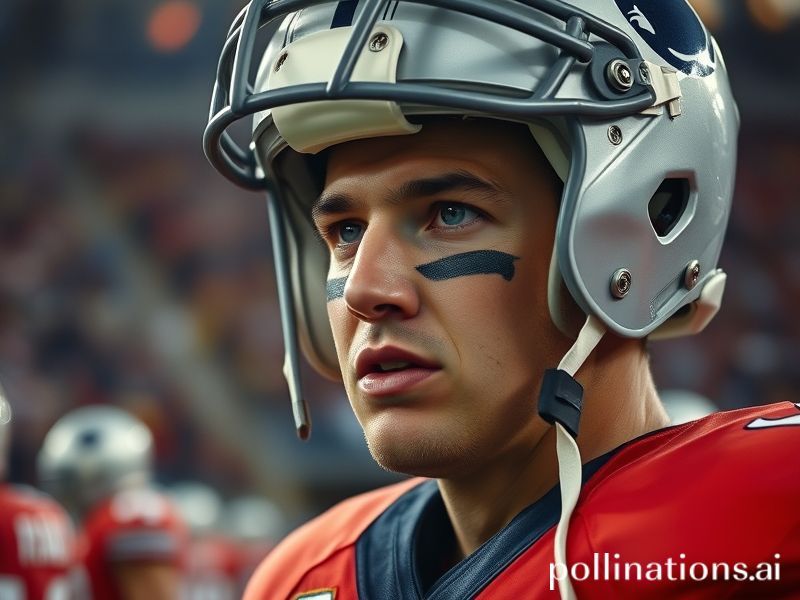sean clifford
Sean Clifford and the Geopolitics of a Backup Quarterback
By Our Man in the Cheap Seats, somewhere over the Atlantic
The name Sean Clifford does not, at first blush, rattle the chandeliers at the UN or trigger emergency sessions of the G7. He is, after all, a 25-year-old American football player who was selected 149th overall in the NFL Draft by the Green Bay Packers—an event broadcast live to 200 countries that have never seen a down outside of a USO tour. Yet Clifford’s elevation to the world’s most lucrative sporting cartel is a tidy parable for our age: a moment when the global economy, the hopes of rust-belt Pennsylvanians, and the attention span of five billion smartphone owners briefly intersect, shrug, and keep scrolling.
Let us begin in Europe, where energy prices are high enough to make even German economists consider burning their ethics guidelines for warmth. Across that continent, young men Clifford’s age are watching YouTube explainers of American football the way their grandfathers once studied Eisenhower’s troop movements. They wear NFL jerseys like exotic tribal scars, signaling membership in a consumer tribe that pays in dollars and dreams in English. Clifford—who once quarterbacked at Penn State under the benevolent dictatorship of 107,000 drunken alumni—now becomes another downloadable avatar of Americana, sandwiched between Taylor Swift trailers and arms-deal press conferences on your nightly algorithm.
Meanwhile, in the Global South, the NFL’s carefully curated “International Home Marketing Markets” (yes, that’s the Orwellian label) have just added Ghana and Nigeria. Lagos sports bars will soon replay Clifford’s preseason interceptions in high-definition while local generators gulp imported diesel. The league’s subtext is transparent: harvest fresh eyeballs before FIFA figures out how to schedule a World Cup every fiscal quarter. Clifford’s left shoulder, insured for more than the GDP of a Maldivian atoll, is suddenly a trans-Atlantic strategic asset. You can almost hear State Department interns adding “cultural export” to his Wikipedia page between coffee runs.
Back home, Clifford’s draft slot carries the whiff of industrial decline. Green Bay, Wisconsin, is a city of 100,000 souls whose last major export was refrigeration units and whose newest is fourth-round quarterbacks. Locals hope Clifford will mature into the reliable backup every franchise needs—an insurance policy against the starter’s ACL discovering gravity. If he fails, the economic fallout is limited: a few jersey printers go bust, sports-talk-radio ratings dip, and another Midwestern boy learns that the American Dream is mostly a deferred maintenance program.
The Chinese internet, ever vigilant for teachable nationalism, has already clipped Clifford’s college highlights to illustrate “Western decadence.” State commentators note that while China trains quantum engineers, America lionizes a man whose job is to throw an inflated pigskin past other men in colored tights. The irony, of course, is that those same clips are monetized by ByteDance, which sells the ad space back to American brands desperate to reach teenagers who can’t find Wisconsin on a map but will definitely buy the scented candle Clifford endorses.
Even the war in Ukraine pauses, microscopically, for the draft. A viral photo shows Ukrainian soldiers in a trench huddled around a cracked iPhone, watching Clifford’s selection on a buffering stream. The caption: “At least someone’s getting good news today.” Dark humor is the last renewable resource of the embattled, and Clifford—unaware, uninvolved—becomes a cameo in someone else’s gallows joke. The planet keeps shrinking until every human anecdote is simultaneously trivial and overburdened with meaning.
So what does it signify, this midsize American quarterback with a 90-mph fastball ego and a contract slighter than the average tech CEO’s annual apology? Nothing, and therefore everything. Clifford is the latest walking placebo administered to a world that would rather argue about play-action passes than antibiotic resistance. He will hold a clipboard, possibly throw a touchdown, more likely fade into broadcast-booth oblivion. But for one weekend he was a tiny pixel in the global feed, proof that even in an era of climate vertigo and democratic decay, we can still manufacture consensus around a man in shoulder pads. The spectacle endures; the apocalypse schedules around commercial breaks.







